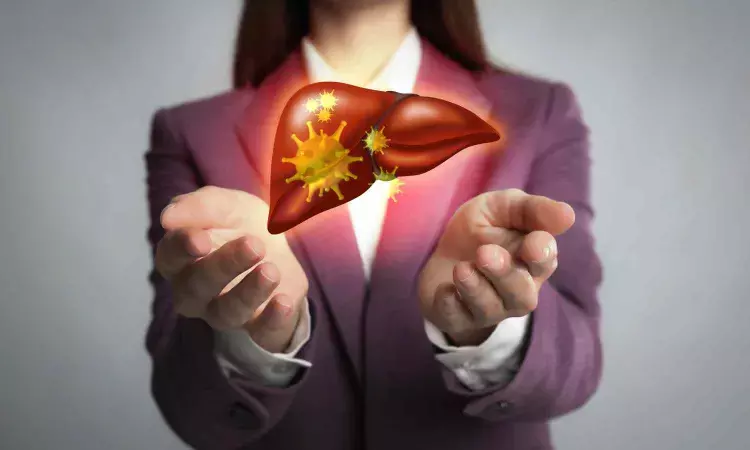- Home
- Medical news & Guidelines
- Anesthesiology
- Cardiology and CTVS
- Critical Care
- Dentistry
- Dermatology
- Diabetes and Endocrinology
- ENT
- Gastroenterology
- Medicine
- Nephrology
- Neurology
- Obstretics-Gynaecology
- Oncology
- Ophthalmology
- Orthopaedics
- Pediatrics-Neonatology
- Psychiatry
- Pulmonology
- Radiology
- Surgery
- Urology
- Laboratory Medicine
- Diet
- Nursing
- Paramedical
- Physiotherapy
- Health news
- Fact Check
- Bone Health Fact Check
- Brain Health Fact Check
- Cancer Related Fact Check
- Child Care Fact Check
- Dental and oral health fact check
- Diabetes and metabolic health fact check
- Diet and Nutrition Fact Check
- Eye and ENT Care Fact Check
- Fitness fact check
- Gut health fact check
- Heart health fact check
- Kidney health fact check
- Medical education fact check
- Men's health fact check
- Respiratory fact check
- Skin and hair care fact check
- Vaccine and Immunization fact check
- Women's health fact check
- AYUSH
- State News
- Andaman and Nicobar Islands
- Andhra Pradesh
- Arunachal Pradesh
- Assam
- Bihar
- Chandigarh
- Chattisgarh
- Dadra and Nagar Haveli
- Daman and Diu
- Delhi
- Goa
- Gujarat
- Haryana
- Himachal Pradesh
- Jammu & Kashmir
- Jharkhand
- Karnataka
- Kerala
- Ladakh
- Lakshadweep
- Madhya Pradesh
- Maharashtra
- Manipur
- Meghalaya
- Mizoram
- Nagaland
- Odisha
- Puducherry
- Punjab
- Rajasthan
- Sikkim
- Tamil Nadu
- Telangana
- Tripura
- Uttar Pradesh
- Uttrakhand
- West Bengal
- Medical Education
- Industry
Thrombocytopenia may not significantly impact effectiveness of endoscopic variceal treatment in cirrhosis patients: Study

China: A recent study on cirrhotic patients with acute variceal bleeding (AVB) found that thrombocytopenia does not significantly impact the effectiveness of endoscopic variceal treatment (EVT).
"The 5-day bleeding control failure rate was comparable between patients with and without thrombocytopenia, including those with mild (7.8% versus 4.6%), moderate (5.8% versus 4.5%), and severe (3.8% versus 5.3%) thrombocytopenia," the researchers reported in Therapeutic Advances in Gastroenterology. The findings suggest that a reduced platelet count may not impact the effectiveness of endoscopic therapy in cirrhotic patients with hematemesis or melena.
Acute variceal bleeding is a life-threatening complication of liver cirrhosis that can be treated effectively through endoscopic variceal treatment (EVT). Despite the efficacy of EVT, there is a risk of early rebleeding, and thrombocytopenia, the most common hemostatic abnormality in liver cirrhosis, remains a concern. However, it is unclear whether thrombocytopenia contributes to EVT failure in cirrhotic patients with AVB. To address this gap, Xingshun Qi, Liver Cirrhosis Study Group, Department of Gastroenterology, General Hospital of Northern Theater Command (Teaching Hospital of China Medical University), Liaoning Province, China, and colleagues aimed to investigate the association between thrombocytopenia and EVT failure in these patients.
For this purpose, the researchers conducted an international multicenter, retrospective study involving 2,467 cirrhotic patients with acute gastrointestinal bleeding. These patients were enrolled in the study between 2020 and 2023. Thrombocytopenia was defined as a platelet count below 150 × 10⁹/L and categorized into mild (100 × 10⁹/L–150 × 10⁹/L), moderate (50 × 10⁹/L–100 × 10⁹/L), and severe (<50 × 10⁹/L) groups. A 1:1 propensity score matching (PSM) analysis was conducted, and the five-day failure to control bleeding was assessed.
The investigation uncovered the following findings:
- A total of 1,079 patients were included in the study, with 923 (85.5%) diagnosed with thrombocytopenia, categorized as mild (n = 241), moderate (n = 445), and severe (n = 237).
- PSM analysis showed no significant difference in the five-day failure to control bleeding between patients with and without thrombocytopenia.
- For mild thrombocytopenia, the failure rate was 7.8% in thrombocytopenic patients versus 4.6% in non-thrombocytopenic patients.
- For moderate thrombocytopenia, the failure rate was 5.8% versus 4.5%.
- For severe thrombocytopenia, the failure rate was 3.8% versus 5.3%.
The researchers noted several limitations, including its retrospective design, which introduces selection bias. Additionally, EVT was performed across different hospitals, and variations in endoscopists' skill levels could have influenced patient outcomes. Long-term outcomes of cirrhotic patients with AVB were not assessed, and crucial data such as liver stiffness, HVPG, and portal vein thrombosis were not available, limiting the exploration of their impact on treatment failure.
"Despite these limitations, the findings suggest that the short-term outcomes of cirrhotic patients with AVB after EVT are not dependent on the presence or severity of thrombocytopenia, indicating that correcting thrombocytopenia with platelet infusion or thrombopoietin before EVT may not be necessary," the researchers concluded.
Reference:
He, Y., Romeiro, F. G., Sun, M., Ji, F., Zhu, Q., He, Y., Ma, D., Yuan, S., Liu, X., Philips, C. A., Basaranoglu, M., Méndez-Sánchez, N., Pinyopornpanish, K., Li, Y., Wu, Y., Yang, L., Shao, L., Mancuso, A., Chen, Y., . . . Qi, X. (2025). Impact of thrombocytopenia on failure of endoscopic variceal treatment in cirrhotic patients with acute variceal bleeding. Therapeutic Advances in Gastroenterology. https://doi.org/10.1177/17562848241306934
Dr Kamal Kant Kohli-MBBS, DTCD- a chest specialist with more than 30 years of practice and a flair for writing clinical articles, Dr Kamal Kant Kohli joined Medical Dialogues as a Chief Editor of Medical News. Besides writing articles, as an editor, he proofreads and verifies all the medical content published on Medical Dialogues including those coming from journals, studies,medical conferences,guidelines etc. Email: drkohli@medicaldialogues.in. Contact no. 011-43720751


